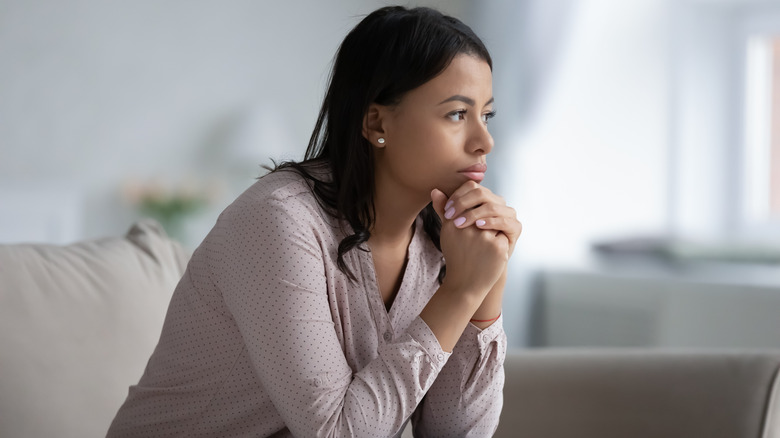The Big Difference Between Antidepressants And Anti-Anxiety Medication
Mental health challenges are rarely easy to navigate. In recent years, society has come a long way to destigmatize conditions like depression and anxiety. However, diagnostic challenges, efficacy, and patient compliance still remain some of the biggest hurdles for both patient and provider. Fortunately, there's a great deal of hope as medication options improve and increased awareness empowers patients to seek the support and treatment they need to get healthy. If you suspect you're having difficulty with anxiety or depression, you're not alone. According to the CDC, between 2015-2018, 13.2% of Americans over the age of 18 used antidepressants and in 2018, 7.2% of adults reported a major depressive episode. Additionally, climbing anxiety rates could be the reason why 12.6% of American adults were prescribed benzodiazepines, a potent anti-anxiety medication (via American Psychiatric Association). When planning your mental health strategy, there are important distinctions between these two pharmaceutical treatment options you'll likely want to discuss with your doctor.
How antidepressant and anti-anxiety medications work differently
Selective Serotonin Reuptake Inhibitors (SSRIs) are a common frontline treatment option prescribed for depression. You may have heard of the popular name brands like Zoloft (sertraline), Prozac (fluoxetine), Celexa (citalopram), and Lexapro (escitalopram). According to Mayo Clinic, these medications work by blocking reabsorption of serotonin in the brain; once it's reabsorbed it's no longer available to carry messages between neurons. Thus, because SSRIs block reabsorption, more serotonin is available to transmit between neurons (via NHS). The NHS further states that depression is too complex to assume that low serotonin levels are the one and only cause for depression, but increasing one's level of serotonin has been shown to be effective, in conjunction with other therapeutic mechanisms like cognitive behavioral therapy.
While doctors may also prescribe SSRIs for depression and even generalized anxiety disorder, benzodiazepines are often prescribed for immediate, short-term relief of anxiety. As such, these kinds of medications are often used to enable patients to accomplish important life tasks that their anxiety may otherwise inhibit (via Anxiety and Depression Association of America). Common medications include Xanax (alprazolam), Ativan (lorazepam), and Valium (diazepam). These medications work by strengthening GABA, a neurotransmitter responsible for feeling calm, relaxed, and sleepy. The effects are short-term, taking effect quickly and typically wearing off within 2-3 hours.
Potential limitations and drawbacks of each
Because SSRIs build up in one's system slowly over time, it typically takes up to two weeks for symptoms to start improving. Some patients have reported unpleasant side effects, which can cause them to discontinue treatment prematurely. It's important to discuss these side effects with your doctor because they often tend to resolve themselves after the first few weeks of treatment, according to Mayo Clinic. SSRIs are generally considered safe but your doctor may factor in important considerations like drug interactions, pregnancy, and the potential for serotonin syndrome to occur. Your doctor will likely also monitor your depression symptoms to ensure they don't get worse, however, SSRIs most commonly improve mood over time. SSRIs are not considered addictive, but certain withdrawal symptoms may occur if patients discontinue use suddenly, without doctor supervision.
Benzodiazepines on the other hand have been reported as highly addictive and should only be prescribed for short-term use (via American Family Physician). Additionally, benzodiazepines are considered dangerous and fatal if mixed with other drugs or alcohol, and can increase depression symptoms and thoughts of suicide, according to the Journal of Clinical Medicine. As such, those with a history of depression or substance use disorders are strongly cautioned against using benzodiazepines. It's recommended they collaborate with their doctor to implement an alternative treatment plan.



